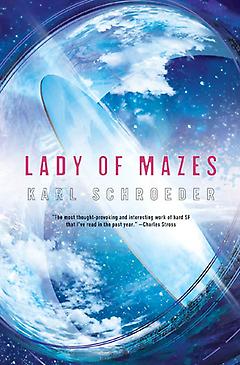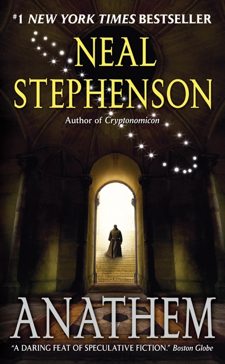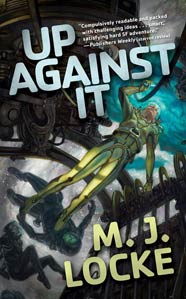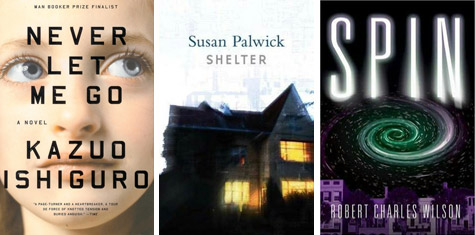A friend who used to read a lot of SF but who hasn’t read any for a while asked me for recommendations for recent science fiction books that I was excited about. These aren’t meant as anybody’s “best,” least of all mine, they’re just science fiction books written in the last ten years that have made me excited about the possibilities of SF all over again. The “sense of wonder” is easy to get when you’re twelve, because everything is new, but books that can give it to me now are valuable.
I thought I’d share my thoughts.
 The first thing to come to mind was Karl Schroeder’s Lady of Mazes (2005). It’s post-everything science fiction, it deals with virtuality, loss of privacy, identity issues, and what it means to be human when it’s possible to edit that. It’s a book that raises huge philosophical issues, and it’s also a cracking good story with great characters. I like all of Schroeder, but this is my favourite book of his so far, and definitely one of the things I want to point to when I say that this is what the genre is capable of.
The first thing to come to mind was Karl Schroeder’s Lady of Mazes (2005). It’s post-everything science fiction, it deals with virtuality, loss of privacy, identity issues, and what it means to be human when it’s possible to edit that. It’s a book that raises huge philosophical issues, and it’s also a cracking good story with great characters. I like all of Schroeder, but this is my favourite book of his so far, and definitely one of the things I want to point to when I say that this is what the genre is capable of.
Robert Charles Wilson’s Spin (2006) takes an original science fiction idea and uses it to tell a double-braided human story. Aliens, or something—they call them the Hypotheticals—have put Earth in a protective cocoon that means that while time passes normally for us, outside the universe is flashing by and the sun is getting dangerously hot. Nobody knows why this has happened, and people respond in all the ways people do—with science, religion, panic and hope. Wilson carries everything through and makes it all work—with great characters and a terrific voice.
Susan Palwick’s Shelter (2007) is a thoroughly imagined near future US where everything has changed but grown out of where we are. It’s about artificial intelligence and the medicalization of character flaws—and even things that might not be flaws. One of the main characters is under intervention for altruism for most of the book. It takes visible trends and extrapolates them out in the way only science fiction can, and it’s doing that with the trends of today—well, 2007. Again, it’s also wonderfully written. Maybe when I was twelve I could get excited by a badly written book with shiny ideas, but not any more.
 Neal Stephenson’s Anathem (2008) is a big novel about the history of philosophy and science—set in an alternate world where that history has been different but parallel—and yet Stephenson manages to make it a ton of fun. There are things wrong with it, and I’ve been reliably informed that the physics makes no sense, but that doesn’t matter because what Stephenson’s doing is writing something new about the way people think and the way the scientific worldview affects everything. It also has geeky scientific monasteries that feel real and are fascinating.
Neal Stephenson’s Anathem (2008) is a big novel about the history of philosophy and science—set in an alternate world where that history has been different but parallel—and yet Stephenson manages to make it a ton of fun. There are things wrong with it, and I’ve been reliably informed that the physics makes no sense, but that doesn’t matter because what Stephenson’s doing is writing something new about the way people think and the way the scientific worldview affects everything. It also has geeky scientific monasteries that feel real and are fascinating.
Geoff Ryman’s Air (2005) is one of those books that draws you in immediately. It’s about a future mind-internet coming to a little third world village that has been on the edges of technological civilization for a long time, and how it affects the people, especially the women. Karzistan is an imaginary country somewhere on the Silk Road. It has always been marginal, been a margin, and it still is. Gibson said the future was unevenly distributed, and this is a brilliant book about the unequal edge of distribution. This is the kind of book that wouldn’t have been written in previous decades because it took a lot of work and ground clearing to get to a place where it was possible to make these characters visible. Which is part of what it’s about.
Elizabeth Moon’s The Speed of Dark (2003) is about an autistic man in the near future. Again it has a very clear distinct voice—and this is indeed something I like in a book, but it’s not something new in the last decade! Speed of Dark is a character portrait of a very unusual character, seen from inside. The way Lou thinks is different and fascinating, and Moon shows us that close up and almost makes us feel what it would be like. This is a book that does rely on a lot of past SF—in particular “Flowers for Algernon”—but which is going on and doing something really interesting with it.
Kasuo Ishiguro’s Never Let Me Go (2005) is a science fiction novel written by a mainstream writer—and the trend for this last decade has been the tendency for these not to suck. (In addition to Ishiguro, Michael Chabon has pulled it off brilliantly.) Never Let Me Go is a dystopia that uses the mode usually used for writing about privilege and nostalgia to talk about appalling things. It’s shocking and powerful and wonderful and original.
 M.J. Locke’s Up Against It (2012) is book I’ve only read once, and which I’m planning to read again and write about really soon. It’s set in a near future solar system, and it’s full of engineering and problems with water and technology and people. It’s a whole lot like the kind of traditional science fiction I love, but it has real rounded characters and the modern solar system—the one science has recently revealed to us, not the one SF has taken as a default setting for so long. Up Against It is exciting to me because it’s doing what old SF did, taking current science and engineering and writing fun stories with it, only with current science and engineering. And current practice of characterisation and plot. It’s a terrific read.
M.J. Locke’s Up Against It (2012) is book I’ve only read once, and which I’m planning to read again and write about really soon. It’s set in a near future solar system, and it’s full of engineering and problems with water and technology and people. It’s a whole lot like the kind of traditional science fiction I love, but it has real rounded characters and the modern solar system—the one science has recently revealed to us, not the one SF has taken as a default setting for so long. Up Against It is exciting to me because it’s doing what old SF did, taking current science and engineering and writing fun stories with it, only with current science and engineering. And current practice of characterisation and plot. It’s a terrific read.
I’m well aware that I haven’t read everything from the last decade. Emmet suggested that Peter Watts Blindsight absolutely belongs on this list, and so does China Mieville’s The City and the City. But I haven’t got to them yet, and so they’re not on my list. I’m sure there are lots of things I’ve missed, and probably lots of things I’ll think of myself as soon as I hit send. (That always happens.) I’d be very interested to have people add to this list in comments, with recent science fiction novels that have made them excited about what science fiction can do. Please don’t list fantasy. I may do a companion post about fantasy later.
Jo Walton is a science fiction and fantasy writer. She’s published two poetry collections and nine novels, most recently the Hugo and Nebula winning Among Others. She reads a lot, and blogs about it here regularly. She comes from Wales but lives in Montreal where the food and books are more varied.










